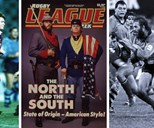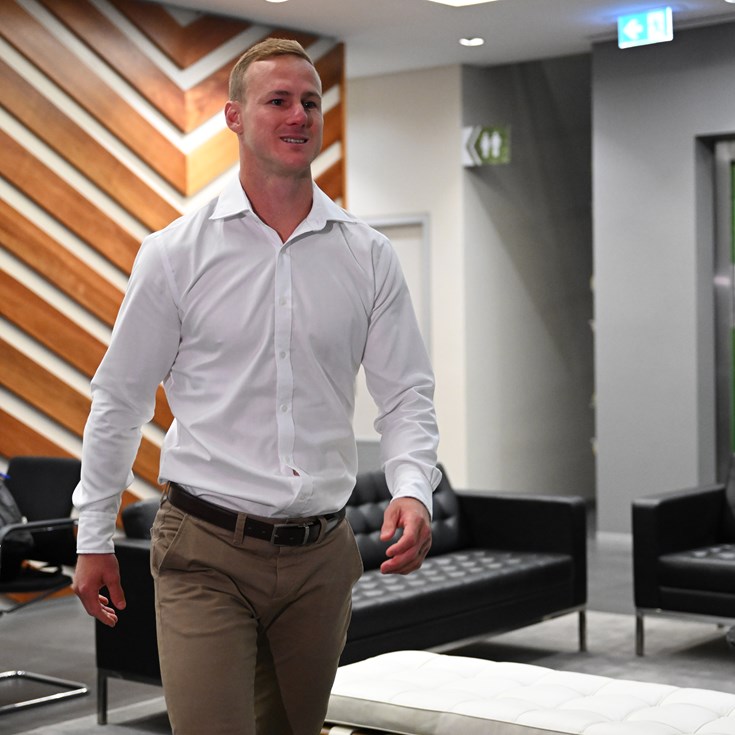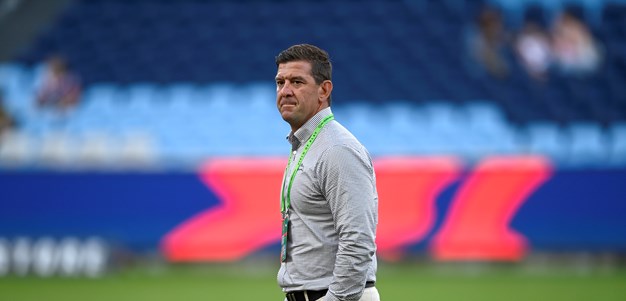The NRL’s plan to play a season-opening double-header in Las Vegas for the next five seasons shapes as the boldest attempt by the game to gain traction in the lucrative American sporting market.
Past attempts have invariably been half-hearted, one-off efforts that have failed to win recognition or achieve any significant results.
This time the NRL is all-in, enlisting the support of as many A-list Australians as possible to help support the initiative.
Russell Crowe explains the rules and laws of rugby league
The games featuring Manly v South Sydney and Sydney Roosters v Brisbane will be played at Allegiant Stadium on Saturday, March 2 (US time) and will be broadcast live in Australia on Sunday, March 3.
Past attempts
League visionary Harry Sunderland would have given 100 per cent support to the NRL’s plans of playing their season-opening double-header in Las Vegas in 2024.
The former Queensland administrator, sportswriter, manager of multiple Kangaroos tours and BBC commentator, who died in 1964, had long supported plans for the game to gain a foothold in the United States.
Sunderland, who played a significant role in the introduction of the game in France in the 1930s, made his first attempts to stage a game on US soil as manager of the 1929-30 Kangaroos.
Sunderland wrote to three California universities with the offer to play a series of demonstration games at Stanford, California or St Marys.
According to the San Francisco Examiner, [the Australian team] “is willing to line up, with eleven men, against a regular American football team, and to see what would happen”.
The paper explained: “There are 28 men in the Australian party. In addition to meeting an American football team, they would be willing to line up with 13 men on a side and give a demonstration of their own Rugby code.”
Sunderland had stated that the only financial assistance required would be “expenses from Panama Canal to San Francisco”, but the offer was not taken up
The next opportunity for rugby league to gain recognition in the US took place in 1954 when Australia and New Zealand played exhibition matches in Los Angeles and Long Beach.
The matches had been organised by an American sportswriter Ward B Nash, who had been introduced to the possibilities of league by Sunderland on an earlier visit.
Initially, Nash had wanted the Great Britain touring team of 1954 to play two games in the US on their journey home from Australia and New Zealand, but the RFL declined the opportunity.
Nash had secured guarantees for games in Long Beach and Los Angeles and his offer was eventually taken up by Australian and New Zealand officials, who agreed to travel to the United States after the inaugural World Cup in France later that year.
Great Scotts: NFL pioneer all-in on Vegas
The games went ahead in late November, the first on November 26 postponed by a day due to fog.
The circumstances of the fog rolling in sparked a famous incident involving Australian winger Denis Flannery who was abandoned in the heavy mist by his team-mates and only discovered the game was cancelled when informed by a young boy walking his dog.
Sunderland was an interested spectator and had helped to publicise the games for Nash.
However, only 1,000 attended the game at Long Beach and 4,554 turned up to The Coliseum in LA.
Australian won 30-12 in Long Beach and 28-18 in Los Angeles.
It was over 30 years before the next attempt was made to garner interest in the huge US sporting market but the staging of a State of Origin match at Veterans Stadium in Long Beach, the same venue that hosted a 1954 game, attracted far more interest from the Australian television audience than it did in the local media.
The official crowd was 12,349 but reports suggested the game was heavily “papered”, an American expression for extensive ticket giveaways.
In 1989 English clubs Wigan and Warrington played an exhibition game in Milwaukee, Chicago.
With the help of expatriates such as former St George halfback David Niu, the game took small steps as a minor sporting pastime in US in the 1990s and American teams attended World Sevens events in Sydney.
A national team was first assembled in 1993 and played internationals against Canada and, in 2004, the Australian team coached by Wayne Bennett, agreed to play an exhibition against the USA Tomahawks following the conclusion of a Tri-Series in England.
The Americans were coached by John Cartwright and included a mix of expats and home-grown players along with former premiership players Brandon Costin and Matt Petersen.
USA v Australia: Test Match, 2004
Played at Franklin Field in Philadelphia, the Tomahawks were on track for a major upset when they led 18-0 late in the first half before the Australians clicked into gear to win 36-24.
In more recent years the highest-profile foray into the US was the staging of an England-New Zealand Test at Broncos Stadium in Denver.
The game drew a respectable turnout of 19,320 to watch the England team, coached by Bennett and captained by Sean O'Loughlin win the one-off game 36-18.
Bennett backs USA expansion
The American All Stars
The American All Stars was a team of young gridiron players assembled in 1953 by sports promoter Mike Dimitro, who had watched rugby league in Australia during World War II.
Not one of the 20 players who made the tour of Australia and New Zealand had ever played the game but after some intensive coaching by prominent Australian coach Norman ‘Latchem’ Robinson, the team embarked on a two-month tour of New South Wales and Queensland, and later New Zealand.
The day a Sydney side took on a Gridiron team in 1953
Despite their lack of rugby league knowledge, the team proved hugely popular and drew 65,000 for its first match in Sydney.
The All Stars entertained with long, spiral passes and other trick shots but it soon became apparent that the team had little concept of rugby league.
The tour assumed farcical proportions at times, with ring-ins and crooked refereeing decisions designed to keep the hapless visitors in the contest. The team won just three (and drew one) of their 18 games in Australia.
This article is an extract from David Middleton's 2023 Official NRL Annual. To purchase a copy visit rugbyleagueannual.com.au




